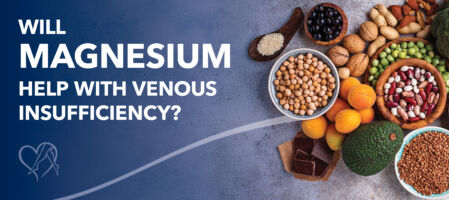
How the Food You Eat Impacts Your Vein Health
What you eat affects your entire body — including your veins. Keep your veins healthy by paying attention to your diet.

If you’re burdened with symptoms such as heavy, aching legs, swollen ankles, or bulging varicose veins, you may be dealing with chronic venous insufficiency (CVI). This common vein condition occurs when the veins in your legs have trouble sending blood back to your heart. Rather than flowing upward, blood tends to pool in the legs, leading to a variety of these uncomfortable symptoms.
Those exploring ways to feel better and boost their circulation naturally may have heard that, much like other supplements, magnesium plays a role in supporting vein health. But does it really make a difference, and if so, how? In this post, we’ll break down what magnesium does, how it might affect your veins, and whether it’s worth adding to your routine.
Whether you’re just starting to manage your symptoms or you’re ready for expert care, Center for Vein Restoration (CVR) is here to help. Schedule your consultation now and discover the joy of lasting relief.
📱 Call our Patient Services Representatives at 240-965-3915 or BOOK ONLINE at a vein clinic near you by clicking the button below. ⬇️

Magnesium is a mineral your body needs for many essential functions. It keeps your muscles and nerves working properly, helps manage blood pressure, and supports healthy circulation. According to WebMD, magnesium also plays an essential role in regulating inflammation.
Here’s how:
The veins in your legs depend on strong, coordinated muscle movements and healthy blood flow to direct blood upward. A study by the National Library of Medicine suggests that magnesium can relax the walls of blood vessels, which encourages blood flow. It may also help prevent leg cramps, a symptom that often worsens for those with poor circulation.
Without enough magnesium, your veins and their surrounding muscles may not function as smoothly as they should. And while magnesium isn’t a cure for venous insufficiency, it may support your overall vascular health and ease some symptoms. Only professional vein treatment can effectively relieve the underlying vein problems and restore healthy circulation.

If you're looking to support your vein health naturally, know that getting more magnesium doesn’t have to be complicated. You can help nourish your veins from the inside out by making a few simple dietary changes. Here’s how:
Magnesium is found in a wide variety of healthy foods. Some of the best sources include:
According to Healthline, these foods not only provide magnesium, but they’re also rich in fiber, antioxidants, and other nutrients that support healthy circulation and vascular health.
While it’s best to obtain nutrients from food, some individuals may require additional support in meeting their recommended magnesium intake, particularly if their diet is low in whole foods or they have an existing medical condition that affects magnesium absorption.
Magnesium supplements are widely available, but it's essential to consult your healthcare provider before starting any new vitamin or supplement. Your doctor can recommend the right type and dose based on your needs and medical history, helping you avoid potential side effects such as digestive upset.
While magnesium may help support the muscles and blood vessels in your legs and make them function more efficiently, remember that it won’t close leaky veins or reroute blood flow like professional vein treatment can. This means it doesn’t address the underlying cause of vein disease.
Visiting a Center for Vein Restoration vein specialist can provide diagnosis and treatment options that target this root cause: the damaged valves in your leg veins.
These treatments may include measures such as compression therapy, which helps push blood upward. Your vein specialist may recommend a series of lifestyle changes, including walking and elevating your legs, or one of several minimally invasive procedures such as sclerotherapy or laser ablation, depending on the severity of your condition and your overall vein health goals.
Put simply, magnesium can be a complementary addition to these treatments, but it’s not a replacement for professional vein care.
If you’re unsure what’s causing your leg symptoms, the best first step (pun intended!) is a professional vein evaluation. Schedule a consultation with CVR today and discover personalized solutions that go beyond supplements.

Magnesium isn’t a magic cure for venous insufficiency, but it may help you support healthy circulation, relieve muscle tension and leg cramps, and reduce inflammation in your blood vessels. It can play a valuable supporting role as part of a comprehensive approach to vein care, alongside medical treatments, exercise, compression, and proper hydration.
That said, if you’re feeling unsure or overwhelmed by your symptoms, you don’t have to go it alone. A Center for Vein Restoration vein specialist can guide you toward treatments that provide long-term relief and give you the confidence to get back on your feet.

Whether you're just curious about magnesium or ready to get your stride back, it’s essential to prioritize your vein health. At CVR, we’re here to answer your questions, provide expert care, and help you feel better fast.
👉 Call our Patient Services Representatives at 240-965-3915 or BOOK YOUR CONSULTATION ONLINE today. Your legs deserve the best.
Q: How do I know if I’m getting enough magnesium?
A: Signs of magnesium deficiency can include muscle cramps, fatigue, or irregular heartbeat, but the best way to know is through a blood test ordered by your doctor.
Q: Can too much magnesium be harmful?
A: Yes, excess magnesium from supplements can cause digestive issues and, in rare cases, more serious problems. Stick to the recommended dosage.
Q: What type of magnesium is best for vein health?
A: Magnesium citrate and magnesium glycinate are commonly recommended for sound absorption, but the best type depends on individual tolerance and health goals.
Q: Can magnesium help with restless legs or nighttime leg discomfort?
A: Yes, magnesium may ease muscle tension and support nerve function, potentially helping with restless legs or leg cramps at night.
Q: Are certain people more likely to have low magnesium levels?
A: Yes. Older adults, people with digestive disorders, those on certain medications, and individuals with poor diets are more likely to be deficient.
